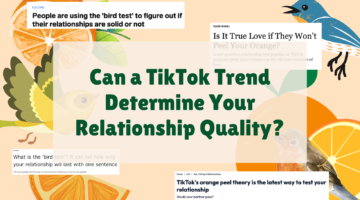The 7 Biggest Relationship Dealbreakers
March 9, 2022 by Justin Lehmiller
Decades of psychological research on attraction has revealed which traits people tend to desire in a romantic partner. Intelligence, honesty, and sense of humor pretty reliably come in toward the top of the list. This research has given us a pretty good sense of what people say they want—but what about the things they don’t want? What are the biggest relationship ‘dealbreakers’ that would lead people to reject a potential romantic prospect?
A recent set of studies published in the journal Personality and Individual Differences sought to quantify this and uncovered seven major themes that characterize the most common relationship dealbreakers. Here’s a look at what they found:
In the first study, researchers conducted an online survey of 155 heterosexual adults aged 18-45 in Europe. Participants were asked to list the traits that would make someone undesirable as a potential long-term and, separately, short-term relationship partner.
Looking across the responses, the researchers extracted the 96 most frequently mentioned dealbreakers, which included things like indecisive, dirty, egotistical, and aggressive. The researchers then conducted a second study to extract the broader themes present in these dealbreakers.
In the second study, 2,445 heterosexual, European adults aged 18-45 rated how likely they would be to reject a potential partner based on each characteristic. Ratings for short- and long-term relationships were collected separately.
The results yielded seven distinct factors that constituted the most common relationship dealbreakers. These factors were:
- Unambitious (indecisive, no sense of purpose)
- Hostile (unfriendly, grumpy)
- Filthy (dirty, stinky)
- Arrogant (egotistical, overly opinionated)
- Unattractive (physically unappealing)
- Clingy (insistent, eager to commit)
- Abusive (aggressive, violent)
The seven major dealbreakers were consistent for men and women, but their importance varied across relationship contexts (short- vs. long-term). For example, while filthy was the strongest dealbreaker across contexts, clingy was considered less of a problem in a long-term relationship, whereas unambitious was considered less problematic in short-term relationships.
Two additional studies were conducted in which the researchers asked participants to simultaneously consider both dealbreakers (what they don’t want) and “dealmakers” (what they do want). The results pointed to the importance of studying both what we want and don’t want, as opposed to just one or the other. But they also suggested that people pay a bit more attention to (or are more keen to know) the dealmakers, as opposed to the dealbreakers.
However, it’s worth noting that some dealmakers and dealbreakers appear to be opposite pieces of information (e.g., attractive vs. unattractive)—so if you already know one, you also know the other.
The results of this study are limited in that all participants were heterosexual and European, so we cannot generalize the findings to LGBTQ+ folks or persons from different cultures. It’s likely that relationship dealbreakers will vary across communities and across different parts of the world based on what is (and is not) valued or considered attractive in a given population.
That said, the findings suggest that certain dealbreaker traits seem to go together and that they can be thought of as a smaller set of broad themes that make a given partner undesirable.
However, we need more research to know the degree to which people actually stick to their dealbreakers in practice. It’s easy to say what we do and don’t want in a partner hypothetically, but what we say versus what we actually do doesn’t always line up. Case in point: some studies of relationships have found that what people say they want in a partner on surveys doesn’t predict who they actually go for in real life.
Thus, an interesting direction for research in this area to go in the future would be to explore the dealbreakers that represent absolutes or red lines as compared to those dealbreakers that simply reflect preferences that one might be willing to compromise on.
Do you have any relationship dealbreakers? Are they similar or different to the ones identified in this study? Let us know in the comments section below.
To learn more about this study, see: Csajbók, Z., & Berkics, M. (2022). Seven deadly sins of potential romantic partners: The dealbreakers of mate choice. Personality and Individual Differences, 186, 111334.
Want to learn more about Sex and Psychology? Click here for more from the blog or here to listen to the podcast. Follow Sex and Psychology on Facebook, Twitter (@JustinLehmiller), or Reddit to receive updates. You can also follow Dr. Lehmiller on YouTube and Instagram.
Image Source: Photo by Nadine Shaabana on Unsplash

Dr. Justin Lehmiller
Founder & Owner of Sex and PsychologyDr. Justin Lehmiller is a social psychologist and Research Fellow at The Kinsey Institute. He runs the Sex and Psychology blog and podcast and is author of the popular book Tell Me What You Want. Dr. Lehmiller is an award-winning educator, and a prolific researcher who has published more than 50 academic works.
Read full bio >


